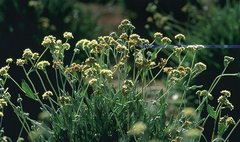Guayule
|
|
| Guayule | ||||||||||||||
|---|---|---|---|---|---|---|---|---|---|---|---|---|---|---|
 Guayule plants | ||||||||||||||
| Scientific classification | ||||||||||||||
|
Guayule (Parthenium argentatum), pronounced 'wa-YOO-lee', is a shrub in the genus Parthenium of the family Asteraceae, native to the southwestern United States and northern Mexico. The plant can be used as an alternate source of latex that is also hypoallergenic, unlike the normal Hevea rubber.
This plant saw a brief and intense amount of agricultural research during World War II when Japan cut off America's Malaysian latex resources. The war ended before large-scale farming of the guayule plant began, and the project was scrapped as it was cheaper to import tree-derived latex than to crush the shrubs for a smaller amount of latex.
Recently, the guayule plant has seen a small but growing resurgence in research and agriculture due to its hypoallergenic properties. While Hevea-derived rubber contains proteins that cause severe allergic reactions in many people, guayule does not. The only guayule products currently on the market are surgical gloves and catheters, but work is currently underway to produce guayule condoms as well.
